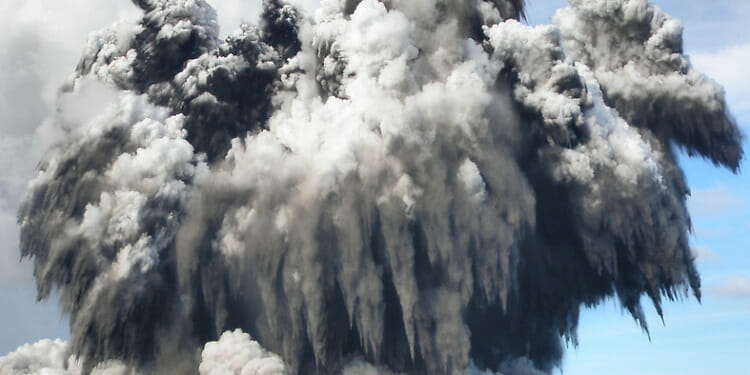Thursday, Jan. 20, Peruvian President Pedro Castillo declared the catastrophe of the Repsol Oil Spill an ‘environmental disaster’ and is relying on international connections in the effort to clean the spill.
The government called upon the United Nations and the U.S. National Response Team to help with proper clean-up accommodations and compensation from the company.
How did the spill happen?
On Jan. 15, the Tonga Volcano erupted on the coast of Peru sending tsunami waves across Tonga and prompting tsunami warnings across Hawaii, Alaska, British Columbia, Chile and Ecuador. As the tsunami waves roared across Tonga, disaster awaited near the La Pampilla refinery outside of Lima, Peru, where an Italian-flagged tanker spilled 6,000 barrels of crude oil into the Pacific Ocean.
Repsol, the Spanish company that operates the refinery, stated the spill was due to the tsunami caused by the Tonga volcanic eruption — La Pampilla refinery is the country’s biggest refinery.
As the volcanic eruption occurred, the Italian shipping company transporting the oil was unloading cargo at La Pampilla when the terminal’s pipeline burst. After the pipe burst, an oil spot was noticed by the ship and staff was immediately ordered to turn off the values and notify authorities.
Repsol claimed the spill was contained, but damaged and blackened waters seemed to prove otherwise.
Could the spill have been prevented?
Alongside Repsol, the Peruvian Civil Institute confirmed in a press release that the cause of the incident was due to strong waves that rocked the ship while employees were loading oil into the La Pampilla Refinery — the strong waves causing the underwater pipeline to burst.
Pipelines are used to transport energy products such as crude oil, gas, diesel, and natural gas liquids ethane and propane. Typically pipelines reside underground and underwater.
Whether pipelines are safe is open to question.
According to the Association of Medical Facility Professionals Worldwide, AMFP, a company which deals with refineries and petrochemical manufacturing — gas, oil and plastic production — reported that 99.999997% of gas and crude oil is moved safely.
Although other reports show differently.
In a research project called “The shadow of oil” by the Sub Group on Oil Spills in accordance with the National Coordinator for Human Rights of Peru, CNDDHH, found that between the years of 2000 and 2019, 474 oil spills occurred in the Pervuian Amazon.
The report also found that 65% of these spills were caused by the corrosion of pipelines and failure of operational facilities.
Correspondingly, an analysis by Richard Stover, Ph.D., and the Center of Biological Diversity found that in the US between 1986-2013 pipelines accidents have spilled an average of 76,000 per year — more than 3 million gallons. This equates to 200 barrels being spilled every day — oil being the most commonly spilled substance.
As this wasn’t the first time natural disasters have led to oil spills and pipeline ruptures, the Peru oil spill definitely can be seen as a result of the Tonga Volcanic eruption, but perhaps the usage of pipelines to transport crude oil is not the most reliable form of transportation for the environment and wildlife — if there even is one.
How will this spill impact the environment?
The Peruvian authorities estimated the spill affected roughly 200,000 square feet of beach and contaminated 21 beaches on the country’s Pacific coast.
Peruvian President Castillo ordered Repsol to take responsibility for the spill, yet they refused to do so.
Despite this, Repsol has deployed roughly 8,000 feet of containment booms — temporary floating barriers used to contain oil spills — and hired 840 people to clean the spill. The company reported on Friday that 53,000 cubic feet of oil has been removed, yet the cleaning effort has been projected to take until the end of February.
As dead seals, fish and birds smothered in oil continue to wash up on the banks of the Pacific — with Peru’s water being known for its biodiversity — environmentalists are concerned for the wildlife population. In particular, the spill affected two protected areas where Humboldt penguins and sea otters reside — the Ancón Reserved Zone and the Pescadores islets.
Currently, biologists from Peru’s national service have been charged with protecting these wildlife areas and saving the animals — though the recovery of these ecosystems could take years.
As Peru is one of the world’s largest fish-producing countries, the spill could also take a toll on the economy in the future, as fishing is currently prohibited within the polluted waters.
In an attempt to make amends, Repsol announced they would hire local fisherman to help with the cleanup, yet when fishing operations will re-commence is uncertain.
President Castillo’s ‘environmental emergency announcement’ is using this oil spill as part of a wider policy to consider how to address the longer-term effects of climate change and reduce carbon emissions.
With oil spills continuing to destroy ecosystems yearly, it seems crucial that countries look at the safety of oil and gas facilities more critically and make every effort to convert to more sustainable energy sources that are better for the environment.
Editor’s Note: The opinions expressed here by Impakter.com contributors are their own, not those of Impakter.com. — Featured Photo: Tonga Volcano eruption on March 18, 2009. Source: Flickr










